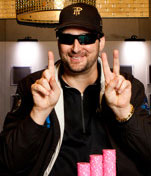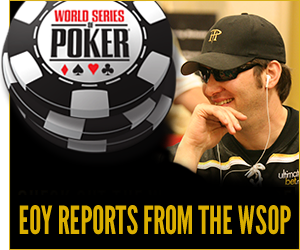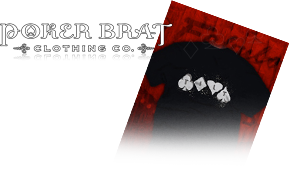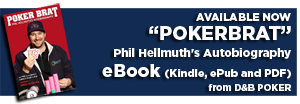-
Furst Versus Worst
In the $1,500 buy-in pot limit Hold ’em tournament at the World Series of Poker (WSOP) this year, more than 1,100 players began the day looking for a coveted gold bracelet, and more than $340,000 for first place. Two days later, nine players sat down at the final table, including top pros John Juanda and Can Hua, high limit player Rick Chase, and “Tilt Boy” Rafe Furst. Juanda was eliminated when his Q-Q lost all-in before the flop versus Hua’s A-K.
With the blinds at $10,000-$20,000, Furst looked down at A-A on the button. He decided to just call the $20,000 bet in order to induce some action. In the old days, a common poker maxim was this: if you slow play your big pair and lose a big pot, then you get what you deserve. This rule seemed set in stone when I first came around the scene in the late 1980s, and for good reason. The top players felt that by slow playing big pocket pairs you were giving your opponents “free cards,” which they then used to bust you. The rule was so prevalent back then that if I ever lost a huge pot slow playing my big pocket pair everyone would say, “You slow played K-K? Of course you got what you deserved.” There was no further discussion needed! Never mind the fact that I was a huge favorite with one card to come when the money went in, or that there may be a good reason why I slow played my hand, or that I actually induced the action that I was hoping for; it was simply “Do not slow play big pairs.” That was then and this is now. In my books, DVDs, and online courses, I talk about why slow playing big pairs can be a great strategy sometimes.
After Furst smooth called (made a call with a raising hand) the $20,000 bet, the player in the small blind called the bet with K-10, and then from the big blind Hua decided to raise it up $60,000 more with 7-2 off suit. Now Furst decided to smooth call one more time, and the small blind folded his K-10. Now we had a rare match up indeed: in fact, we had the worst hand in Hold ’em (2-7) versus the best hand in Hold ’em (A-A). The flop came down Q-7-7, Hua bet out $55,000, and Furst smooth called one more time. Of course, Furst was continuing his “trap” of Hua, not knowing that Hua had already outdrawn him. On the turn, a three came off, Hua checked, Furst bet out $53,000, and Hua raised Furst’s last $60,000 or so. Furst called instantly, only to find out that he was a 20-to-1 underdog with one card to come — Furst needed an ace, and there were two aces left in the deck.
But what of the slow playing going on during this hand, and how did Hua play the hand? First, let’s address Hua’s play of this hand. I do not mind his raise pre-flop trying to steal the $60,000 in the pot. I mean, ideally Hua would recognize somehow that Furst has pocket aces, as great players seem to sense when their opponents have the best possible hand, and then Hua could abandon any thought of making a move before the flop. As to his bet on the flop, I love this bet. He bet $55,000, which was less than the size of the $60,000 raise he made pre-flop. Making a bet this size will induce a call from Furst with any pocket pair he may have started out with as well as it gives Furst the chance to bluff at the pot. I love the check on the turn as well. Why not let Furst do the betting for you? I mean you pretty much know you have an unbeatable hand.
I do not mind Furst’s pre-flop smooth call for $20,000. His smooth call of Hua’s $60,000 raise is more questionable. Furst limped in to induce action, and that he did! But why not raise it back another say, $80,000 or so, and take that $60,000 raise — that you induced Hua to make — down into your stack (after Hua folds)? I mean how much money are you trying to win when you limp in with pocket aces? How many free cards will you give your opponent? You have to ask: wouldn’t that $120,000 pot look good to a guy that only had another $227,000 in chips? If so, then re-raise and try to win it right there. On the other hand, I don’t mind the super slow play so much. I mean, by smooth calling right the $60,000 raise Furst is also inducing a bet or a bluff on the flop from Hua. So all-in-all Furst’s $60,000 smooth call was slightly worse then the re-raise.
On the flop Furst just called the $55,000 bet, and I love this play. I mean, what hand could beat him at this point in the hand? Also, there were no draws out there — no flush draw or straight draw to worry about. I also love Furst’s $53,000 bet on the turn. By betting so little, he was luring Hua into calling, and still the board made his hand extra strong. As far as his call of Hua’s all-in raise, this was an easy and natural call for Furst to make. Amazingly, the last card was an ace, and Furst went on to win his first WSOP bracelet.
Related Posts
- The Holiday Game
- Poker for Police Officers
- No ‘Blow-Up’ for Matusow
- Cunningham Going for the Gold
- Winning from the Hole
- After-Hours Poker
- Key Hand at European Poker Championships
- Make the Most of It!
- One Tough Poker Game
- My Big ‘Over Bet’
Recent Posts
- WSOPE 2nd place finish
- Update from this years WSOP 2019
- Happy Holidays! Updated stock at Poker Brat, new book!
- Phil Hellmuth wins historic 15th World Championship!
- Final golden ticket winner coming soon
- Poker Brat – The Phil Hellmuth Jr. Autobiography
- Phil Hellmuth’s “Pokerbrat” – Coming soon to audio book!
- Poker Night in America – Sugar House Casino
- Sugar House w Matt Glantz
- Lost and found

 ™
™








